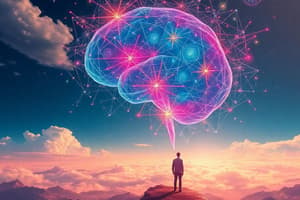Podcast
Questions and Answers
What are the three main processes involved in memory?
What are the three main processes involved in memory?
- Identification, categorization, codification
- Encoding, storage, retrieval (correct)
- Attention, recognition, details
- Recall, sensory stimuli, decoding
What type of memory is involved when you unconsciously navigate to a familiar location?
What type of memory is involved when you unconsciously navigate to a familiar location?
- Semantic memory
- Declarative memory
- Episodic memory
- Implicit memory (correct)
Which of the following best describes explicit memory?
Which of the following best describes explicit memory?
- Memory based on sensory stimuli alone
- Memory that operates unconsciously
- Memory that involves skills and habits
- Memory that requires intentional recollection (correct)
What is NOT a characteristic of short-term memory?
What is NOT a characteristic of short-term memory?
Which process describes the initial step of getting information into the memory system?
Which process describes the initial step of getting information into the memory system?
Which of the following is NOT an example of implicit memory?
Which of the following is NOT an example of implicit memory?
What is the role of attention in memory processing?
What is the role of attention in memory processing?
Which of the following aspects does NOT describe the nature of memory?
Which of the following aspects does NOT describe the nature of memory?
What type of memory typically requires greater conscious effort to recall information?
What type of memory typically requires greater conscious effort to recall information?
In older adults, which type of working memory is more likely to decline?
In older adults, which type of working memory is more likely to decline?
Which factor does not typically contribute to the decline of episodic memory in older adults?
Which factor does not typically contribute to the decline of episodic memory in older adults?
Which memory type is characterized by unconscious recall without the need for intentional recollection?
Which memory type is characterized by unconscious recall without the need for intentional recollection?
What is the effect of familiarity versus recollection on older adults' memory performance?
What is the effect of familiarity versus recollection on older adults' memory performance?
What is the main mnemonic for recalling episodic memory?
What is the main mnemonic for recalling episodic memory?
Which of the following factors can improve recall in older adults?
Which of the following factors can improve recall in older adults?
In which aspect does semantic memory show stability in older adults?
In which aspect does semantic memory show stability in older adults?
How does age typically affect procedural memory in older adults?
How does age typically affect procedural memory in older adults?
What is a significant aspect of autobiographical memories in older adults?
What is a significant aspect of autobiographical memories in older adults?
Which of the following best describes how episodic memory differs from autobiographical memory?
Which of the following best describes how episodic memory differs from autobiographical memory?
What characterizes the reminiscence bump during ages 10-30?
What characterizes the reminiscence bump during ages 10-30?
Which statement correctly differentiates between event-based and time-based prospective memory?
Which statement correctly differentiates between event-based and time-based prospective memory?
What is a significant challenge in diagnosing depression among older adults?
What is a significant challenge in diagnosing depression among older adults?
Which factor is primarily responsible for the increased risk of complications due to delirium in older adults?
Which factor is primarily responsible for the increased risk of complications due to delirium in older adults?
What is the first stage in the information processing model?
What is the first stage in the information processing model?
Which component of working memory is responsible for processing visual and spatial information?
Which component of working memory is responsible for processing visual and spatial information?
What type of memory includes facts and general knowledge?
What type of memory includes facts and general knowledge?
What defines the capacity of short-term memory according to the information processing model?
What defines the capacity of short-term memory according to the information processing model?
What is automatic processing characterized by?
What is automatic processing characterized by?
Which type of memory allows us to perform skills and tasks without conscious thought?
Which type of memory allows us to perform skills and tasks without conscious thought?
How does attention affect the processing of information?
How does attention affect the processing of information?
What aspect of information processing tends to decline as individuals age?
What aspect of information processing tends to decline as individuals age?
Which of the following is a characteristic of selective attention?
Which of the following is a characteristic of selective attention?
Which of the following is true about the encoding process?
Which of the following is true about the encoding process?
Study Notes
Memory and its importance
- Memory is crucial for recognizing people, remembering tasks, and performing everyday activities.
- It provides us with a sense of self and situates us in time and space.
- Loss of memory can significantly impact identity and relationships.
- Memory is a constructive process that involves encoding, storage, and retrieval.
- Sensory stimuli trigger memories, which are processed and stored in short-term and long-term memory.
Types of Memory
- Sensory Memory: This is the initial stage where we interact with environmental information.
- Iconic Memory: Memory for what we see, lasts less than half a second.
- Echoic Memory: Memory for what we hear, lasts about three to four seconds.
- Working Memory: This holds information that we are currently thinking about.
- Visuo-Spatial Sketchpad: Processes visual and spatial information.
- Phonological Loop: Processes verbal information, including words and numbers from both echoic and iconic memory.
- The Central Executive: Integrates information from both components into the Episodic Buffer, which connects to Long-term memory.
- Long-Term Memory: This is the final stage where information is stored like files on a computer.
- Explicit (Declarative) Memory: Facts and events we can consciously recall.
- Semantic Memory: Facts and general knowledge.
- Episodic Memory: Personal experiences and events.
- Implicit (Non-Declarative) Memory: Skills and procedures performed without conscious thought.
- Procedural Memory: How to perform tasks like riding a bike.
- Priming: Previous experiences influencing the interpretation of current events.
- Explicit (Declarative) Memory: Facts and events we can consciously recall.
Attention
- Attention is the capacity or energy necessary to support information processing.
- It involves alertness, ignoring distractions, attending to relevant information, and managing multiple sources of information.
- Automatic Processing: Performs tasks with minimal demands on attentional capacity, often done unconsciously.
- Effortful Processing: Requires full attentional capacity, leading to tiredness after prolonged periods of effortful processing.
Age-Related Changes in Memory and Attention
- Speed of Processing: How quickly and efficiently the early steps in information processing are completed.
- Declines at different rates for older adults, depending on the task and its difficulty level.
- Processing Resources: The amount of attention needed for a particular situation. Older adults generally require more attention for complex tasks.
- Selective Attention: Ability to distinguish relevant from irrelevant information. Older adults find it challenging to filter out irrelevant information.
- Divided Attention: Ability to distribute attention across multiple sources of information. Older adults struggle with complex divided attention tasks.
- Working Memory: Limited capacity, actively processes and holds information in mind.
- Rehearsal: Process of keeping information in working memory.
- Age-related decline: Spatial working memory declines more than verbal working memory.
- Factors influencing decline: Alertness levels, task order, and interference.
- Long-Term Memory:
- Implicit Memory: Varies with age.
- Decline in tasks involving learning sequences of information. No decline in learning spatial contexts.
- Explicit Memory:
- Episodic Memory: Generally stable until age 55-60, with a steep decline from age 65.
- Semantic Memory: Remains relatively stable throughout aging.
- Autobiographical Memory: Shows few age-related losses.
- Flashbulb Memories: Memories of personally traumatic events. It is difficult to measure age-related declines.
- False Memories: Older adults have difficulties separating misleading context from relevant context.
- Implicit Memory: Varies with age.
Prospective Memory
- Remembering to perform a planned action in the future.
- Time-based tasks show greater decline with age (self-initiated cues), while event-based tasks show minimal decline (given cues).
The 3 Ds of Mental Health and Ageing
- Dementia: Progressive neurological disorder, impacting cognitive function, memory, thinking, and social abilities.
- Depression: Mood disorder prevalent among older adults, characterized by persistent sadness, loss of interest, and physical symptoms.
- Delirium: Acute, fluctuating state of confusion, often triggered by medical conditions, medication side effects, or substance withdrawal.
Studying That Suits You
Use AI to generate personalized quizzes and flashcards to suit your learning preferences.
Description
Explore the significance of memory in our daily lives, affecting identity and relationships. This quiz delves into the types of memory, including sensory, working, and their functionalities in encoding and retrieval processes.




